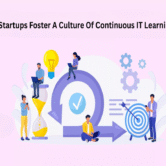
What is the role of mentorship in IT learning for startup teams?
Knowledge Transfer and Skill Building
- Provides practical, real-time guidance on tools, systems, and workflows.
- Bridges the gap between theory and application through example.
- Accelerates the learning curve for junior or non-technical staff.
- Supports deeper understanding through hands-on coaching.
- Enables tailored instruction aligned with startup context.
Support for Continuous Learning
- Encourages ongoing feedback and growth-oriented conversations.
- Helps mentees stay current with emerging tools and trends.
- Promotes informal learning alongside structured training.
- Builds motivation through accountability and encouragement.
- Reinforces a learning mindset across the team.
Cross-Functional Collaboration
- Connects employees from different departments and perspectives.
- Enhances shared understanding of how tech supports business goals.
- Encourages open dialogue around challenges and solutions.
- Strengthens communication between technical and non-technical roles.
- Fosters empathy and teamwork across the organization.
Career Development and Confidence
- Supports skill development for future roles and responsibilities.
- Builds leadership qualities among mentors and mentees alike.
- Offers role modeling that inspires confidence in navigating tools.
- Increases job satisfaction through personal growth.
- Clarifies career paths tied to technical competency.
Knowledge Retention and Scalability
- Reduces dependency on external training or documentation.
- Preserves institutional knowledge as teams expand.
- Promotes consistency in how tools and systems are used.
- Encourages a learning culture that scales with company growth.
- Reinforces best practices across evolving systems.





